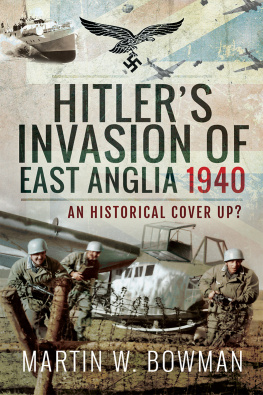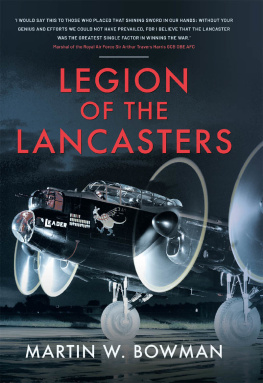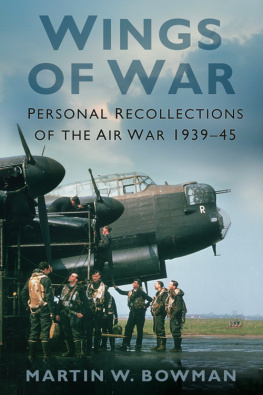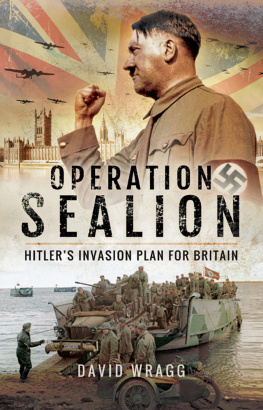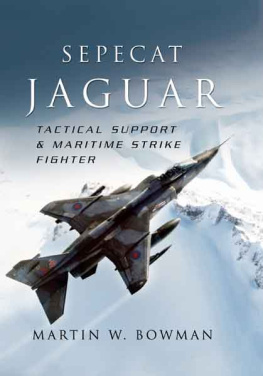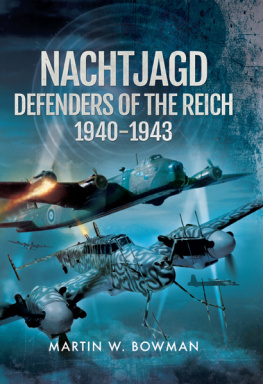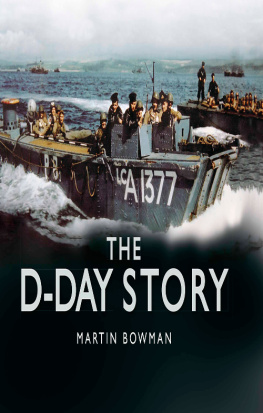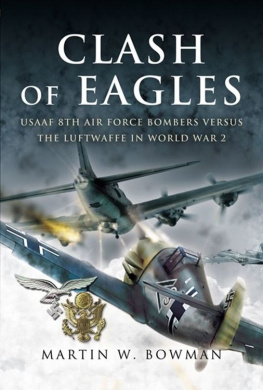Martin W Bowman - Hitlers Invasion of East Anglia, 1940
Here you can read online Martin W Bowman - Hitlers Invasion of East Anglia, 1940 full text of the book (entire story) in english for free. Download pdf and epub, get meaning, cover and reviews about this ebook. year: 2020, publisher: Casemate Publishers & Book Distributors, LLC, genre: Non-fiction. Description of the work, (preface) as well as reviews are available. Best literature library LitArk.com created for fans of good reading and offers a wide selection of genres:
Romance novel
Science fiction
Adventure
Detective
Science
History
Home and family
Prose
Art
Politics
Computer
Non-fiction
Religion
Business
Children
Humor
Choose a favorite category and find really read worthwhile books. Enjoy immersion in the world of imagination, feel the emotions of the characters or learn something new for yourself, make an fascinating discovery.
- Book:Hitlers Invasion of East Anglia, 1940
- Author:
- Publisher:Casemate Publishers & Book Distributors, LLC
- Genre:
- Year:2020
- Rating:5 / 5
- Favourites:Add to favourites
- Your mark:
- 100
- 1
- 2
- 3
- 4
- 5
Hitlers Invasion of East Anglia, 1940: summary, description and annotation
We offer to read an annotation, description, summary or preface (depends on what the author of the book "Hitlers Invasion of East Anglia, 1940" wrote himself). If you haven't found the necessary information about the book — write in the comments, we will try to find it.
Hitlers Invasion of East Anglia, 1940 — read online for free the complete book (whole text) full work
Below is the text of the book, divided by pages. System saving the place of the last page read, allows you to conveniently read the book "Hitlers Invasion of East Anglia, 1940" online for free, without having to search again every time where you left off. Put a bookmark, and you can go to the page where you finished reading at any time.
Font size:
Interval:
Bookmark:

HITLERS INVASION OF EAST ANGLIA, 1940
AN HISTORICAL COVER UP?
In Memoriam
Herbert Philip Bowman 20 July 1926-16 November 2002
First published in Great Britain in 2019 by
PEN AND SWORD AVIATION
an imprint of
Pen & Sword Books Limited
Yorkshire Philadelphia
Copyright Martin W. Bowman, 2019
ISBN 978 1 52670 548 8
eISBN 978 1 52670 550 1
Mobi ISBN 978 1 52670 549 5
The right of Martin W. Bowman to be identified as the author of this work has been asserted by her in accordance with the Copyright, Designs and Patents Act 1988.
A CIP record for this book is available from the British Library
All rights reserved. No part of this book may be reproduced or transmitted in any form or by any means, electronic or mechanical including photocopying, recording or by any information storage and retrieval system, without permission from the Publisher in writing.
Pen & Sword Books Ltd incorporates the imprints of Pen & Sword Archaeology, Atlas, Aviation, Battleground, Discovery, Family History, History, Maritime, Military, Naval, Politics, Railways, Select, Social History, Transport, True Crime, Claymore Press, Frontline Books, Leo Cooper, Praetorian Press, Remember When, Seaforth Publishing and Wharncliffe.
For a complete list of Pen and Sword titles please contact
PEN & SWORD BOOKS LTD
47 Church Street, Barnsley, South Yorkshire, S70 2AS, England
E-mail:
Website: www.pen-and-sword.co.uk
Or
PEN & SWORD BOOKS
1950 Lawrence Rd, Havertown, PA 19083, USA
E-mail:
Website: www.penandswordbooks.com
In history you dont ever get positive, conclusive evidence.
Dr. James E. Crisp
North Carolina State University
Authors Note
History is not an exact science; it is an agreed upon lie. Therefore the contents of this book are factual, save for Chapter Nine, in which I make no apology for using the false document technique to create verisimilitude in a work of fiction. By inventing and inserting documents that appear to be factual, an author tries to create a sense of authenticity beyond the normal and expected suspension of disbelief for a work of art. The goal of a false document is to convince an audience that what is being presented is factual. In this case Chapter Nine is speculative but while false documents intentionally blur the boundaries between narrative non-fiction and fact, if the factual clues presented in the preceding chapters are studied and pieced together then some or all of its parts may indeed have happened.
At this juncture I would like to record my appreciation for the valuable contributions made by James Hayward; Jim Drane of the National Trust; David Kibble-White; Peter D. Antill BA (Hons) MSc (Econ) PGCE (PCE) and The Museum of the British Resistance Organisation (B.R.O.) at the Parham Airfield Museum in Suffolk.
At present we lie within a few minutes striking distance of the French, Dutch and Belgian coasts and within a few hours of the great aerodromes of Central Europe. We are even within cannon-shot of the Continent.
So close as that! Is it prudent, is it possible, however much we might desire it, to turn our backs upon Europe and ignore whatever may happen there? I have come to the conclusion - reluctantly I admit - that we cannot get away. Here we are and we must make the best of it. But do not underrate the risks- the grievous risks - we have to run.
Broadcast by Winston Churchill, 16 November 1934.
The reader of these pages in future years should realise how dense and baffling is the veil of the Unknown. Now in the full light of the aftertime it is easy to see where we were ignorant or too much alarmed, where we were careless or clumsy. Twice in two months we had been taken completely by surprise. The overrunning of Norway and the breakthrough at Sedan, with all that followed from these, proved the deadly power of the German initiative. What else had they got ready - prepared and organised to the last inch? Would they suddenly pounce out of the blue with new weapons, perfect planning and overwhelming force upon our almost totally unequipped and disarmed Island at any one of a dozen or score of possible landing-places? Or would they go to Ireland? He would have been a very foolish man who allowed his reasoning, however clean-cut and seemingly sure, to blot out any possibility against which provision could be made.
Their Finest Hour by Winston S. Churchill.
On Monday 28th August 1939, having been advised to report to the Recruiting Depot at Bradford, Yorkshire, 19-year-old Jim Dinty Moore caught the train from his home in Hawes at the head of Wensleydale and set off on the first leg of a journey that would last six years and five months. During the summer of 1939 he had been accepted as a wireless operator. AC2 Moores feelings were a mixture of excitement and apprehension and he certainly had no idea that within twelve months he would be flying over Western Europe as a member of the crew of a Bristol Blenheim. During the summer of 1939 the Royal Air Force prepared itself for war as best it could, with the faint hope, as in previous years that war could be averted by the politicians. In so far as the aircrew were concerned, they believed they were ready to fight, not realising that in many cases their aircraft were to prove to be no match against the Luftwaffe. Being young they did not appreciate, nor want to appreciate, the horrors of war, even though most of them knew some of those who had survived the appalling battles of Flanders during the 1914-18 War, a mere twenty years earlier.
On Sunday morning, 3rd September, Dinty Moore was sitting in a barrack block at Padgate, a training establishment on the outskirts of Warrington, having joined the RAF only four days earlier, when the radio in his hut was switched on and instead of the normal programmes serious music was being played. It was then solemnly announced that the nation was to be addressed by the Prime Minister, Neville Chamberlain.
Arthur Neville Chamberlain, born 18 March 1869 and educated at Rugby School, was a Conservative politician who had served as Prime Minister from May 1937. He remembered the horrific losses of the First World War and was determined to avoid hostilities with Adolf Hitlers Germany, if at all possible. Chamberlain is best known for his appeasement foreign policy and in particular for his signing of the Munich Agreement in September 1938, which conceded the German-speaking Sudetenland region of Czechoslovakia to Germany. On 30 September Chamberlain flew back to London in triumph, stating he had reached agreement with Hitler. Large crowds mobbed Heston aerodrome where he was given a letter from King George VI assuring him of the Empires lasting gratitude and urging him to come straight to Buckingham Palace to report. The streets were so packed with cheering people that it took Chamberlain an hour and a half to journey the nine miles from Heston to the Palace. After reporting to the King, Chamberlain and his wife appeared on the Palace balcony with the King and Queen Elizabeth. He then went to Downing Street where both the street and the front hall of Number 10 were packed. As he headed upstairs to address the crowd from a first-floor window someone called to him, Neville, go up to the window and say peace for our time. Chamberlain turned around and responded, No, I dont do that sort of thing . Nevertheless, he recalled the words of his predecessor, Benjamin Disraeli and his return from the Congress of Berlin in his statement to the crowd: My good friends, this is the second time there has come back from Germany to Downing Street peace with honour. I believe it is peace for our time. We thank you from the bottom of our hearts. Now I recommend you go home and sleep quietly in your beds. The RAF was stood down. There was no applause, only heartfelt relief but no one felt proud of themselves. They
Next pageFont size:
Interval:
Bookmark:
Similar books «Hitlers Invasion of East Anglia, 1940»
Look at similar books to Hitlers Invasion of East Anglia, 1940. We have selected literature similar in name and meaning in the hope of providing readers with more options to find new, interesting, not yet read works.
Discussion, reviews of the book Hitlers Invasion of East Anglia, 1940 and just readers' own opinions. Leave your comments, write what you think about the work, its meaning or the main characters. Specify what exactly you liked and what you didn't like, and why you think so.

